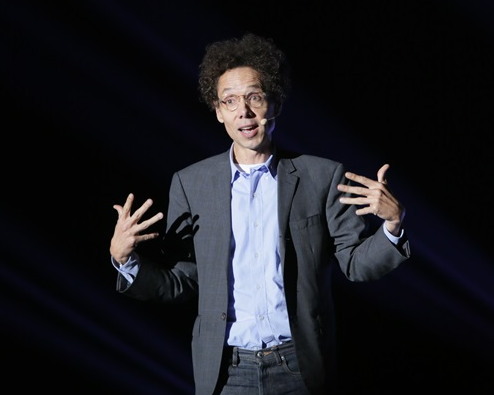Finding the recipe for success is a task that has stumped a countless number of people, but best-selling author Malcolm Gladwell said the key to success lies in one’s character traits.
The Canadian writer and journalist said the key to accomplishing wonders has little to do with people’s skills and has more to do with their family background and character.
“Revolution begins not by the smartest or the people who are the most powerful, but by the people who have courage, imagination and a sense of urgency,” he said Friday during a lecture at Korea University, hosted by Micimpact and Pagoda Education Group.
Courage has been often been touted as a personality trait that drives people to accomplishment, but Gladwell said it was closely linked with another trait of being disagreeable.
“Not caring about what other people say. It is an incredibly important characteristic of an entrepreneur or a person who wants to change the world,” he said.
 |
Malcolm Gladwell (micimpact) |
According to Gladwell, the revolutionary changes are often subject to much criticism and to be successful, one has to stand up to that. This is hard to accomplish since all human beings are “hardwired to need the approval of our peers,” he said.
Gladwell used anecdotes of Malcolm Mclean, who revolutionized the shipping industry in the 1950s by coming up with the idea of the shipping container.
Mclean had realized that the price for loading and unloading the goods was actually more than the cost of the voyage. He then came up with the idea of using detachable containers, of which many people disapproved.
“When he (Mclean) set out with his notion of using containers, everyone thought he was crazy. They said ‘Oh, we tried this before,’ which they did and failed,” Gladwell said.
Many financial struggles later, the idea ultimately propelled him to his position as a business magnate.
Being hardnosed is not enough without the imagination that allows the person to be creative, he said. Successful entrepreneurs have the capacity to reimagine their world by reframing the problem in a way no one had framed it before.
Before Mclean, people in the transportation or shipping industries would only come up with solutions in relation to their own line of work. But he wanted to reframe the entire process, Gladwell said.
“He would tell people, ‘You’re not a shipper; you are not a trucker. You are in the business of moving things from here to there,’” Gladwell said. He redesigned the connection between the trucks and the containers, and introduced a railway line to help the cranes that would lift the cargo onto the docks.
But sometimes coming up with a great idea does not guarantee profit for the innovator. Gladwell said that to be successful, one needs a sense of urgency.
Gladwell used the example of Steve Jobs. The technology behind his iconic Macintosh and its innovative graphic user interface originated from Xerox, but Jobs was the one urgent enough to rush back to his company and turn the concept into a reality.
“Does he have more resources than them (Xerox)? Does he have greater insight than them? No. They’re wiser than him. They realized it was the future of computing. All he did was listen,” Gladwell said. “Jobs had a sense of urgency. He speeds to Cupertino and says, ‘Drop everything, we’re doing this now.’”
He added that some of the critical traits required for success can be obtained through training and by understanding the problems that we face. “It’s not (like) you’re born one way or another.”
Gladwell is a long-time writer for the New Yorker and best known for authoring “Outliers,” “Tipping Point” and “David and Goliath.” He is also famous for his 10,000-hour rule, in which he claimed 10,000 hours of deliberate practice is needed for becoming a professional in cognitively demanding fields.
By Yoon Min-sik (
minsikyoon@heraldcorp.com)








